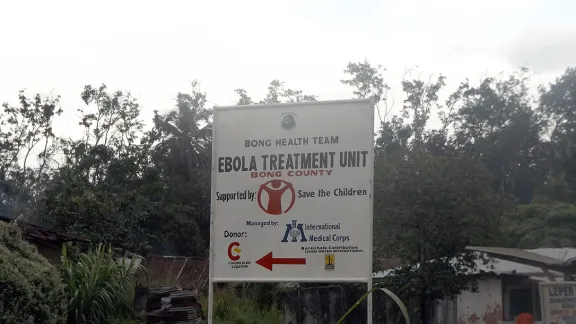
Sign pointing to the newly opened Ebola Treatment Center near Phebe Hospital. Photo: LCL
Lutheran Churches in Liberia and Sierra Leone Reach Out
(LWI) - The Lutheran World Federation (LWF) is inviting churches throughout the Lutheran communion to join in solidarity prayers this Sunday, 28 September, for churches and communities affected by the Ebola crisis in Central and West Africa.
The prayer invitation through the LWF Department for Mission and Development (DMD) supports a recent message by the LWF Vice-President for Africa Bishop Dr Alex G. Malasusa, encouraging Lutheran churches impacted by Ebola to “find comfort in knowing that your brothers and sisters are praying for you.”
The prayer day is also an opportunity to make a financial contribution to support the diaconal and disaster preparedness capacity of Lutheran churches in the most severely affected countries.
According to the World Health Organizations (WHO), over 2,900 deaths from the Ebola virus disease (EVD) had been confirmed in Guinea, Liberia and Sierra Leone by 21 September 2014.
Liberia: Dealing with Ebola Consequences
In Liberia with more than 1,670 EVD deaths and more expected, Bishop Dr Jensen Seyenkulo of the Lutheran Church in Liberia (LCL) emphasizes the church’s collaboration with the government and other religious and international organizations. He points out that one of the consequences of the Ebola outbreak is that there are far too many other deaths from curable diseases, which the overstretched health system is not able to prioritize in the current emergency.
Seyenkulo shares his deep appreciation for the ongoing prayers from churches throughout the world. He, however notes, “Everyone of us has in one way or the other been affected. We continue to lose either friends or relatives and this is so scaring and traumatizing too.”
The LCL continues to raise awareness through its “Stand Against Ebola” campaign, launched on 7 September to sensitize community members about the disease. “Reports coming from the districts have been very encouraging,” he says, of the initiative.
Medical supplies from LCL partners abroad have been received for the church’s health institutions including Phebe and Curran hospitals. Phebe, which has been operating at a limited capacity officially opened at full scale on 15 September. While its Ebola Holding Center being constructed through support from the ACT Alliance is incomplete, “the good news is, the government-owned Ebola Treatment Center near Phebe in Bhong County, is now in operation,” Seyenkulo adds.
Sierra Leone: Helping Quarantined Households
In neighboring Sierra Leone, with nearly 600 deaths to Ebola according to WHO, Bishop Thomas J. Barnett of the Evangelical Lutheran Church in Sierra Leone (ELCSL) says despite the euphoria following the recent three-day nationwide shut down “we are yet to be appraised of any gains regarding the Ebola disease itself.” Yet, he adds, “We give thanks to God for sparing mercies and for the knowledge that there are others out there who continue to be with us in prayers.”
The ELCSL is collaborating with the government and other organizations to raise awareness about Ebola and support community members. At the Incarnation Lutheran Church in Kenema congregations members have formed committees that distribute basic food supplies to quarantined households and Ebola survivors, with financial support from the Lutheran church partners. “These items have been received with joy,” adds the congregation’s pastor Rev. Victor Mbomah Fabbah.
“Ebola is one of the most serious calamities that have befallen inhabitants of the region in recent times in human history. It will take time for the pains to be healed and the tears to be wiped away,” Fabbah adds.
Pain in the Entire Communion
Reflecting on the situation of LWF churches and other churches and communities in the Ebola-affected countries, LWF General Secretary Rev. Martin Junge, emphasizes that prayers, financial support and other forms of solidarity are much needed in this challenging health crisis.
“As we explore collaborative ways of supporting our brothers and sisters in these countries, let us continue to uphold them in our prayers. When one part of the communion is sick, mourning, suffering and distressed, this pain is shared by the entire communion.”


